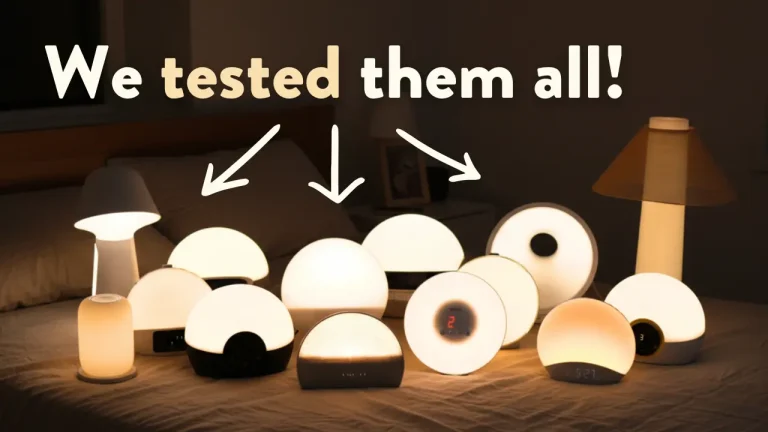Blue-blocking glasses are often recommended for improving sleep, but do they actually do that?
We’re going to examine the scientific evidence and see what it says!
Do Blue Light Blocking Glasses Improve Sleep?
I would like to point out from the outset that clear blue-blocking glasses will absolutely not help improve your sleep. They don’t block even remotely enough high-frequency light for that.
You can just take a look at our blue-blocker database to see that.
Amber-colored glasses however have been shown time and time again to help improve sleep in patients with insomnia, jetlag, and other sleep phase disorders.
A systematic review was recently published in 2021 that helps to confirm what we all know.
In this review, researchers looked at a total of 29 studies containing over 450 participants, many of which were randomized control trials, and came to this conclusion:
“Out of the 24 publications focusing on sleep, there was substantial evidence for blue-blocking glasses being a successful intervention for reducing sleep onset latency in patients with sleep disorders, jet lag, or variable shift work schedules. Given the well-established biological mechanism and clinical research showing that blue-blocking glasses are effective for inducing sleep, they are a viable intervention to recommend to patients with insomnia or a delayed sleep phase.”
Evening wear of blue-blocking glasses for sleep and mood disorders: a systematic review
There you have it! Do we really need any more evidence that such a simple cost-effective therapy is worth implementing in our daily lives?
One interesting study I found compared amber blue blockers against a grey pair of glasses. What this study set out to discover was whether a similar reduction in lux would result in a similar benefit. Or is it the blue light reduction itself that is beneficial?
The authors made sure that both lenses allowed through a total of 1300 lux. To achieve this, a light source of 4000 lx was needed for the orange lens glasses, while only 2200 lx was needed for the grey lenses.
Not surprisingly, when the experimental lens groups were subjected to the bright light, there was an obvious difference in the melatonin suppression between the two lenses.
You can see that the grey lens in Graph A shows a significant drop in melatonin production, while Graph B with the amber lenses has a very minor drop in comparison.
This minor drop may still be due to either the sheer brightness of the light source or the author’s note that this may also be due to the fact that the amber lenses used still let in about 11% of the blue light.
Interesting study though I think!
At any rate, there’s plenty of scientific evidence for the efficacy of using amber blue-light-blocking glasses to help improve your circadian rhythm, sleep, and overall health.
Simply put them on 2-3 hours prior to your bedtime, and you’re good to go! Check out our list of recommended blue blockers here, or visit our database to find some for yourself!
Frequently Asked Questions
Blue Light Glasses Benefits
Wearing amber or red blue-blocking glasses at night has a host of amazing benefits!
- Less insomnia
- Faster sleep onset
- More energy during the day
- Cancer prevention
Exposure to blue light at night will cause the body to stop producing melatonin, which can lead to many negative consequences.
For example, it is well-studied that most cancer patients seem to have less melatonin, which has led research to suggest that using blue blockers or low blue lighting at night could be a useful cancer prevention!
But really, using blue blockers can help to align your circadian rhythm, which will, in turn, improve every single facet of your health.
What Do Blue Light Glasses Do?
Blue light glasses reflect violet, blue, and often some green light from entering your eyes. These colors contain more energy than say, yellow, orange, or red.
Blocking some of this light during the day with clear lens blue locking glasses can help some people with eye strain or headaches while blocking this light in the evening will help you to fall asleep by promoting the release of melatonin.
Are Blue Light Glasses Bad For Your Eyes?
The only way that blue-blocking glasses could be bad for your eyes is if you wear the wrong kind at the wrong time.
Wear clear or yellow lenses during the day, and amber or red lenses at night.
Can I Wear Blue Light Glasses All the Time?
Clear lens blue blockers can be worn throughout the day if you’d like. Check out our guide if you’d like to find the best pair.
However, amber or red-colored glasses should only be used 2-3 hours prior to your desired bedtime since the high-frequency light they block is needed to align your circadian rhythm to the daytime.
We also have a post on the best evening blue blockers if you’re looking for a pair.
Do Blue Light Glasses Help With Headaches?
Blue light glasses can absolutely help with headaches! However, you may find that the clear lens versions aren’t enough, and you may need to use yellow lenses in order to find some relief.
For migraines and headaches, however, you may find that migraine glasses are a better fit. These glasses primarily utilize the science of green light therapy to alleviate headaches.
If you’d like to see some of our favorites you can check them out here!








